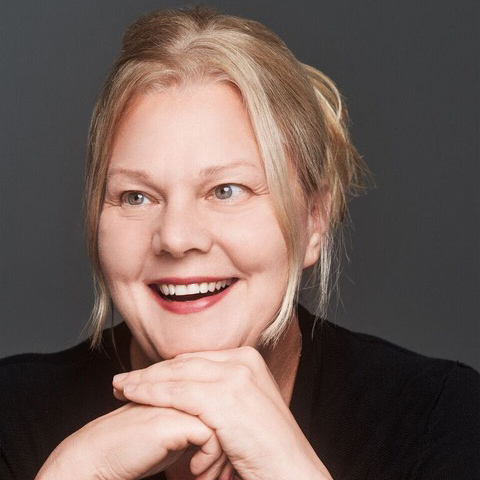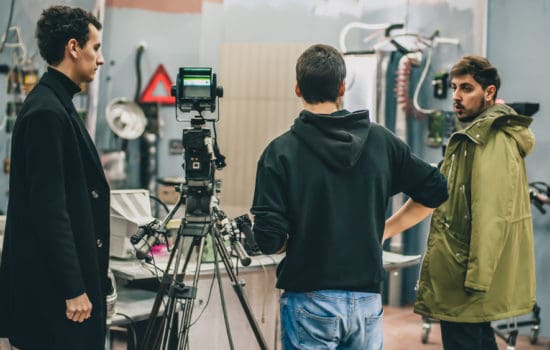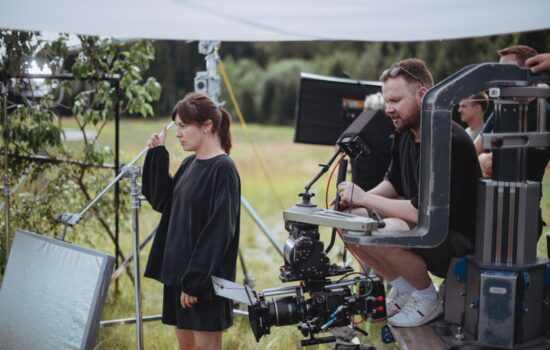Producer (Film)
Career Overview
A Producer is the person who heads up or assists with the production of a film, TV show, or other types of entertainment. Depending on the nature of the position, a Producer may develop scripts, find financing, hire the crew, or be involved with all of these aspects of content creation.
Alternate Titles
Movie Producer, Film Producer
Avg. Salary
$750,000 per film (for a studio-backed production)1
Salary Range
$250K-$10M (for studio-backed productions)1

How To Become a Producer (Film)
People also ask
Career Description
The title of Producer stems from the function they serve: to propel the production of a film, TV show, or other form of content. On a simple one or two-day shoot, there may be a single Producer. In many cases, though, multiple Producers are part of a production, each with a specific responsibility towards making the project happen.
A Producer can be self-employed or work as part of a production company or studio, but in either scenario, they are integral to the success of taking a project from script to screen. Generally the first to board a production and last to leave it, it’s a Producer’s job to oversee a film, TV show, commercial, web series, or other type of entertainment all the way from conception to distribution.
As mentioned, productions generally have more than one Producer. Because the scope of a project is often too large for a single person to handle all aspects of production, which includes script development, hiring cast and crew, and raising funds, multiple Producers are necessary during the life of a project.
Paula Wagner, the woman behind films such as Jack Reacher and Mission: Impossible III, provides a concise and accurate overview of what it means to be a Film Producer.
Producers find content ideas, hire Screenwriters or TV Writers as needed, help develop scripts, and provide feedback during the writing process. They also pitch projects to financial backers to obtain funding. Once a Producer has found financing for a project, they’ll start looking for a Director and other essential crew, as well as weigh in on casting decisions.
A Producer also manages a project’s budget and oversees all business decisions. They ensure that the project is delivered to its backers on time and within budget.
Once principal photography is completed, the Producer can also weigh in on all aspects of post-production, including editing and scoring. If a Producer has been involved from the inception of a production and secured funding for it, they get final say.
When a film or TV show is ready for release, the Producer will make decisions on distribution and marketing so that it reaches the correct audience and hopefully becomes a financial and critical success.
A Producer may spend years bringing a single project to life, which typically translates to them having multiple projects in various stages of development, production, and post-production at any given time. As such, it’s important for a Producer to be both flexible and resilient about projects they care about.
To learn more about building a career as a Producer, we talked to:
- Lynn Hendee (The Glorias, Julie Taymor’s A Midsummer Night’s Dream, Ender’s Game)
- Lindsay Lanzillotta (Shayda, Spin Me Round, The Men in My Life)
- Robert Rippberger (The Inventor, Our Son, Those Who Walk Away)
- Mary Jane Skalski (My Salinger Year, Before You Know It, American Animals)
What does a Producer do?
The role of a Producer depends on the scope of a film. For a large project with many moving pieces, a single Producer might have a very specific role such as overseeing the creative team. For a smaller project, though, the Producer will likely wear more hats. In general, it’s up to the Producer to get financing for a film and see it through the five stages of filmmaking, which are development, pre-production, production, post-production, and distribution.
How do you become a Film Producer?
Some people become a Producer by doing it–they start producing short films and low budget features and learn by doing. Other people start by doing something else in the business and then taking those skills and moving them into producing–like working in script development or in post-production.
A hybrid of those two ways is by working with an established Producer–learning the skills of the job and then starting to do parts of the job as one gains experience.
There are lots of entry points. I know Lawyers who are also Managers or Producers.
There’s a way to do it in a more corporate way by entering the system in a role such as an Assistant, which is a great way to work your way up if you assert yourself.
The other way to become a Producer is the act of doing it. I would encourage you to do it in a way that’s as informed as possible so you’re not wasting money. If you’re in the independent space and that’s where you want to be, encouraging investors and keeping those investors is helpful–meaning keeping their money flowing and not being irresponsible with it.
Really love what you do. People will try and break you. I also like to think that, as a Producer, you’re the mother and the father of the production. So you do have to have some leadership skills and be welcoming to everything.
It requires a lot of tenacity, I would say. Films are personal, right? When someone says “no” you can take it really personally, but you can still try and remember it’s a business. If you don’t have a personal love for it, you should take something else.
I often tell aspiring Producers that you can become a Producer simply by deciding that you are one. That is because a Producer is usually someone who finds a story or an idea that she or he feels passionately about and believes can be developed into a film or television show. So, just find that film idea or story, and begin the process.
If it is a book, for example, then contact the rights owner and make an offer, even if it is a free “sweat equity” option. Once you have the right to shop the book, start trying to “attach” people to your project such as a Director or Screenwriter or Actor or financing entity. Begin building your project.
Easier said than done, of course, but it is a process that can be accomplished with a good idea/story, and plenty of passion and hard work. And a bit of luck.
Another way to become a Producer is to attend a school that has a film program and begin to learn about all aspects of film and form relationships with other aspiring filmmakers. You can also offer to intern for an established Producer or apply for entry level jobs at agencies, production companies, etc. as stepping stones for your ultimate goal of producing.
Advancement as a Producer is by working with even more talented, resourceful, and connected Producers. They build a production company, work with a specific “name” Actor, collaborate with a major studio, acquire a film fund, and/or have a first look deal with a major distributor.
If you have access to money then you can jump in immediately. Money reigns in the film industry. If not, then it takes hard work and thinking outside the box. There are the typical ten thousand hours that it takes to become an expert.
Salary
A general estimate of what a Producer could make on a studio-backed film may fall in the ballpark of around $750,000 including backend points. The wider salary range for studio Producers generally runs from $250,000 for first-time Producers all the way to $10,000,000, which was Jason Blum’s first-dollar backend on Get Out.
Curious about the kind of salary you can expect as a Film Producer? This video breaks down how individuals in this role earn a living.
A Producer’s salary can vary widely based on how far they are in their career and the success of their previous and ongoing projects. In addition to their upfront salary, a Producer will generally get backend points that can become highly lucrative should the film be a hit.
Like many other creative professionals who work in entertainment, it can – and often does – take years before a Producer can earn a sustainable living solely through their projects. Given the ebb and flow of the industry, a Producer’s annual earnings can also fluctuate from year to year.
How do Film Producers make money?
It depends on the size of the film; it’s based on budget. You can get a fee for producing, just like a Director would get paid. With the Producers Guild [PGA], you don’t have to be a member. It’s not like the Directors Guild where there’s rate cards or rate sheets. But I have to say, it really ranges with independent films. As it increases in budget, you make larger fees. But it usually equates with the budget.
On top of that, as a Producer–and again, it depends on what kind of film you’re involved in–you can retain some sort of ownership of the film. You can help exploit the rights to the film, especially on small ones. You also have a portion of what is called the back end of the film, so if it ever makes a profit after your investors have been paid back with the return on their investment, then it’s profit participation time. And that’s divided up in a point system where Producers usually retain some points.
So you can make money that way. In independent film, it’s pretty hard to get to that point. You’ll be making money off of your fees, or you may be in some sort of situation where you’re working with a company and have a salary.
Generally, Producers make money by receiving producing fees set out in the production budget. In other words, Producers don’t normally get paid unless their film or television show is actually produced and financed. It is possible to make profits from a successful show, but profitable shows are few and far between.
A Producer can be paid a modest development fee for “setting up” a project with a studio, production company or other financier.
Producers’ fees are tied to the budget of the project–so the bigger the budget the more the overall Producer fee will be. However, most of the people who are credited on a project as a Producer get their fee from the same pool. So a lot of Producers sometimes have to share the pie.
Hey, what do you think about trying our new Film Career HelperFilm Career Helper really quick? It’s totally free and could help get your career moving fast! Give it a try. It’s totally free and you have nothing to lose.
Career Outlook
Given the continual growth of content platforms, there are ample work opportunities for aspiring Producers.
Traditional mediums such as feature film, network television, and commercials have and will continue to need Producers to helm and assist in the production process. With the explosion of cable, streaming, and other online outlets over the last several years, even more options exist now for those looking to become a Producer.
What are the responsibilities of a Film Producer? How exactly do they make a movie? Watch this video to find out.
However, while an aspiring Producer can choose from any number of entertainment and marketing mediums, it’s important to keep in mind that much of the time and energy that a Producer puts into a given project may initially be a labor of love.
Unless a Producer is working as part of a studio or production company, the hours spent developing and even producing a project may go unpaid until that project is bought, making the outlook for an aspiring Producer both bright and one that may entail considerable effort before financial success is found.
Is Producer a good career?
Being a Film Producer can be a highly fulfilling career, and in some cases, a very lucrative one as well. But as with any other specialty in the filmmaking business, it comes with highs and lows. A Producer often puts in the most hours – in terms of months or even years! – on a project, and frequently those hours are a labor of love. Until a Producer is working with a production company or studio on a movie, they may not get paid for their work until the film is distributed and the revenue from ticket or streaming sales starts coming in. In short, being a Producer can be a great career for someone passionate about their work who is willing to sometimes sacrifice the stability and financial security of other careers.
Career Path
As with many other specialties in the entertainment industry, there is no single career path to becoming a Producer.
For some individuals, that path may begin with college. Prior to starting their professional careers, many Producers pursue the study of film, which can help in instructing them about the many aspects of development, production, and post-production with which they must be familiar to competently oversee during the course of a project.
Should an aspiring Producer want to be strictly involved with the financial aspects of filmmaking, pursuing a degree in business can also be a steppingstone to a future career.
That being said, formal studies aren’t necessarily required to become a successful Producer. Much of what a Producer does can be learned on the job. For this reason, many Producers may immediately pursue a professional career without a degree.
Should the project be small, such as a short film, they may be able to helm it even without any prior experience. However, learning on the job typically translates to starting on projects as a Production Assistant or other type of lower-level position, especially if starting out in feature film or television.
This video provides a quick overview of the steps to take to begin on the path to becoming a Film Producer.
With experience gained, a Producer may then earn the title of an Associate Producer, which generally means that they have a more contained set of responsibilities for a given project. Should they be primarily interested in the budgeting of a project, they may pivot into a Line Producer role. If primarily interested in the story aspect of a project, they may become a Creative Producer. As you may have already realized, the term Producer is wide-ranging and can apply to any number of jobs required in the making of a film or other type of content.
Many Producers gravitate towards a particular part of development, production, or post-production and prefer to produce for that specific part of the filmmaking process.
But as they acquire more experience and projects under their belt, a Producer can potentially take on more responsibilities and even start creating their own opportunities via sourcing content ideas and helming projects from start to finish.
While a person on this career path might be an independent Producer for the entirety of it, they may also get hired by a production company or studio along the way or alternate between being an independent Producer and a hired Producer over the course of their career.
Experience & Skills
While some skillsets may vary for a Producer should they focus on a particular part of the filmmaking or content creation process, others can be incredibly helpful regardless of their area of expertise or specialty.
For one, a Producer must understand how to manage – manage schedules, funds, personnel, and even their own time and energy. Especially when a Producer is helming a project and seeing it through from development to distribution, they must become an expert at having many proverbial balls in the air.
Two, a Producer must understand the fundamentals of filmmaking and content creation. While they aren’t necessarily expected to be experts in directing, cinematography, editing, or the other specialties necessary for making a film, they do need to know enough to communicate effectively with the professionals who are experts in their respective fields.
Film Producer Christina Sibul describes her on-set experience.
Given that a Producer is the person who generally has the final say in who is hired for a project, knowing what is needed to execute those jobs effectively is key to the success of that specific project and the Producer’s career at large.
Three, a Producer must excel at networking and creating connections within the entertainment industry. Whether a Producer is exploring content ideas, pitching those ideas to a production company or studio, or trying to convince potential financiers to invest in a project, they can only be successful in their efforts by making the connections that will help them achieve their goals.
Much of filmmaking – or TV making, web series making, etc. – is a numbers game, so an aspiring Producer cannot expect the first person they reach out or pitch to will be the person collaborating with them on a project. It takes a lot of reaching out, rejections, and reaching out again before a project is made. That means having ample connections in the industry.
What skills does a Producer need?
Tenacity may be the most important quality in a Producer. It can take a long time to get your project on the screen. It is not a profession of instant gratification. A Producer is a leader and should be able to keep a wide variety of personalities focused on the same goal of making the best film or television show possible. When necessary, you should be able to resolve conflicts which usually means listening well and communicating clearly.
Passion, commitment and solid sales skills are important during the often long process of putting your project together and even in the marketing of the final product. Solid storytelling skills are critical because the foundation of any good film is a good story. Learning how to work with Writers, recognizing a good (or poor) script, giving useful notes, are all important skills to develop and hone.
The most important skills for being a Producer are interpersonal skills, a love for filmmaking, legalese, management skills, hiring, and fundraising. They have to be good at making relationships, both personal and business. The power of a Producer comes from their ability to get deals and leverage resources, so every dollar is stretched.
You need to be clear on what the artistic vision of the project is. The most important thing is that you support the Writer and Director’s vision and that you find honesty in your project. You have to live with it for a really long time because it can take years to make these projects, even if you got the money on the first day.
You have to love the projects you’re picking. In many ways–although you’re not a spokesperson for the project in the same way as the Director and the Actors–you’re the spokesperson for the business side of things. So if people don’t believe you, it’s very hard to finance your project.
As far as the basic skills in independent spaces, you need to learn about fundraising. You need to learn about business and you need to enjoy reading contracts. You need to have good interpersonal skills to manage people.
When I’m managing a production, especially in the independent space, I like to know everyone. It’s usually around 45-50 people in a crew, even on independent films, in all of the departments. (Even if there are just one or two people in all of the departments.) To be honest, I feel like you’re a Counselor because you’re managing all of the personalities to intersect and work cohesively together. This goes back to wanting to stay true to the artist and Director’s vision.
Continuing on the basics, it’s really good to know Movie Magic Budgeting and Scheduling if you can. I have a really good understanding of scheduling because I used to do it myself, although I don’t do it myself anymore. I did it for a period of time so that I would have the skills to be able to budget for a movie even without having the schedule. At least do the first draft of a budget.
I think if you’re in the independent space, it’s really good to know how to budget. I know a lot of Producers that don’t know how to budget, but at least know how to read budgets and give notes on budgets. That’s a skill I encourage people to learn.
I also encourage someone to intern somewhere where you can learn more about accounting. I really admire another filmmaker I know; he started doing production accounting and then did the payroll job for a summer so that he understood it. Then he became a Production Accountant and then he became a Line Producer. And that was his route to producing, which I thought was super cool.
Whereas with me, I was doing everything on a small set production, so I had to manage the books and teach myself basic accounting practices and how to ask the questions. I like to know how every single penny is spent in my mind even though I’m not line producing.
If you have those entry-level skills in accounting and budgeting, it helps you be able to manage a crew, even with those interpersonal skills. When you tell someone, “We can’t afford that,” or, “No, until it can be yes. Let me move something around in the budget,” you can actually figure that out and problem solve.
A good Producer needs to understand storytelling (because that is what we are making) and needs to understand people (because it takes a lot of people to make a film or a series and you need to put a great team together and keep them on the same page and motivate everyone throughout the process).
A good Producer should also be organized and be self-motivated.
What are 5 types of Producers?
A small, independent film might have one person who holds the title of Producer. But in many cases, a movie will necessitate different types of Producers brought on to oversee various aspects of a film, such as financing, budgeting, hiring, and creative decision-making. For this reason, there are several Producer titles that can be used during the making of a movie, including Executive Producer, Associate Producer, Co-Producer, Supervising Producer, and Coordinating Producer.
What is a Producer’s role in film/TV?
There are many different kinds of Producers and many roles a Producer can take on. In my case, the Producer’s role when making a film/TV series usually starts with acquiring underlying material, i.e. a book, idea, article, script, etc. The Producer oversees the development of the written material until it becomes a shooting script.
In the case of a series, this also includes overseeing the “bible” or breakdown of the season’s episodes. The Producer hires the Director(s) unless a Director is already involved from the beginning. The Producer helps cast the leading roles, hires the key crew and generally oversees the entire production including the budget, shooting schedule and financing aspects.
During production, the Producer is on set making sure all is going according to plan or, if not, that the revised plan makes sense. The Producer is an important set of eyes on the various takes while shooting, as well as a key voice regarding the quality of the dailies. The Producer deals with the many spontaneous issues that come up during production including personnel problems, creative questions, and generally lending support to the Director, crew, and Actors.
During post-production, the Producer oversees the editing of the show, gives creative notes on the cuts, the scoring, and other finishing processes. Importantly, the Producer is usually involved, to some degree, in the marketing and distribution of the film.
The Producer is the liaison between the money and the artistic process. People ask me what my job is and I’ll say: when you watch the Oscars and you recognize the person that wins for Best Picture, that’s usually the person that actually produced it.
Because they’re there from beginning-to-end and do all the details in between. That means you have to manage the business of the artistic process, as well as manage the artistic process that’s going on under that umbrella of production. You’re reporting to both sides and collaborating with both sides to make it work. You’re the boss of production.
The weird thing about being a “Producer” is that it is both a job and a title. Sometimes the person who does the job doesn’t get the title and sometimes the people who get the title don’t do the job, or they don’t do the whole job. The whole job of being a Producer is to shepherd a project from the time the Producer is involved until the very end.
Sometimes that begins when a Producer finds material–like a book–and thinks it should be made into a film or a series. Sometimes it happens when a Producer finds a Director or Writer they want to work with and then together they find and develop material. Sometimes it begins when a project is already underway and there is a need for a Producer with a specific skill set to come aboard.
But wherever they enter into the process, a true Producer has an impact on what is being made. The day-to-day job changes as the project evolves, but includes giving script notes and edit notes, figuring out how to take something into the marketplace for financing, reaching out to potential cast, structuring the financing deal, putting a crew together, working on the budget, making sure everything is done in a safe way, liaising with the studio (or financing entity), the list goes on and on.
Ultimately, the Producer is constantly working to achieve the creative vision the best possible way with the resources that you have. That gives you some idea but it’s pretty all-encompassing. And if it’s the job for you, it’s a lot of fun.
It is wearing a bunch of hats. It’s being operations and deal-driven. They know the social dynamics to navigate, lead, and inspire a crew. Their primary job is to create a space for artists to do their best work.
The work and life balance for film are always incredibly complex. There are no set hours for being a Producer. Often, they’ve got to stay late and/or be the first person there. It’s crucial to set aside a space to maintain one’s sanity.
This applies to being on set as well as in the world. It’s good to know going into it that all your relationships (personal, friendship, and family) will be affected. There is nothing even close to a nine-to-five with this job.
Education & Training
As mentioned, a Producer may begin their career by pursuing a college degree in film, business, or another type of study that can directly benefit their professional pursuits.
College can also provide opportunities for emerging Producers to gain experience through student films or other similar projects, as well as offer a space for connections and professional relationships to be made.
If an aspiring Producer chooses not to pursue college, they must get their education on the job.
If you’re a novice Film Producer who’s looking to make their first feature film, this video offers tips on how to do it smartly and successfully.
That means seeking out opportunities to be part of films, TV shows, web series, or other types of productions. These opportunities might be in the form of internships, Production Assistant positions, or other entry-level roles where it is understood that they are learning while working.
Several organizations offer programs to help aspiring Producers gain the expertise needed for a successful career. The Producers Guild of America has PGA Create, an immersive lab for Creative Producers from underrepresented communities. The Sundance Institute also provides a Producers Program for emerging Independent Producers.
Resources such as filmmaking-centric websites and filmmaking channels on YouTube can offer aspiring Producers free instruction and information as they pursue their careers.
What do Producers major in?
In my case, my undergraduate degree was in Business Administration and my master’s was in Producing from USC. However, there are many majors that are useful for success as a Producer.
Certainly, Literature or Writing majors are helpful as are any business, Marketing, or Communications degrees and, of course, Film/TV majors.
Many Producers began as Lawyers, so that is another route.
However, if you have already majored in something else such as Science or Music or History or even Math, you may have encountered an idea or story within those fields about which you have deep knowledge and feel would make a great film.
I don’t think there is anything specific that Producers major in–but I think having a good sense of story is important so classes in Literature and Drama are helpful, and any classes that help refine your analytical and writing skills. I think having a few classes in Accounting and Business isn’t a bad idea either.
I’m not sure a degree in film is necessary but I suppose it can’t hurt. However, if you get a degree in Film I would make sure you still take as many Literature classes as you can.
Story, story, story plus a rudimentary knowledge of accounting.
Whether or not to attend film school is a question people need to ask themselves critically. It can be a great environment to push a person further and expand their horizons without the complete experience being a crash course. That way an aspiring Producer doesn’t have to learn on the job.
However, filmmaking is an art as well as a business. One should ask themselves if they can learn more by taking their tuition and putting it into films of their own. At the end of the day, it’s a sink-or-swim scenario so sometimes it’s best to just jump in. That said, the networking and friendships that come out of film school are often invaluable.
I think you should go to business school or law school or both. I did write my LSATs with the intention of going to law school, but I knew very firmly that I wanted to produce movies at that point or be a Producer. My brother, who is a Lawyer, discouraged me and said “don’t.” He said, “You’ll waste your time, you’ll wind up being a Lawyer for a bit, and then you won’t have gotten all this experience.”
I do love the contract side of things, which a lot of people don’t. I didn’t go that route but I do think of all that knowledge. I like to nerd out on it.
I’ve gone to a lot of tax credit seminars for different states and countries, which can be very cheap or free. I’m actually Canadian. I’m from Toronto but I’ve been in LA for thirteen years. I learned about international co-productions in case I ever want to do something with different countries in Canada.
I don’t consider myself a real numbers nerd. I didn’t take Calculus and Stats in University. I was more artistic. This is the one thing I do love to say–the film business is a business. Whether you want to be a Writer or Director, the more you know about the business the better. You’re going to have to read your own contracts. You’re going to have to manage your own money. All of those skills are helpful for life.
I tell the kids in my family, if you wanna be a Plumber and you go to business school, you might know how to run a plumbing business and you can be the Head Plumber of that plumbing business. It’s the same principle. If you go to business school or have a couple years in business training, it helps you because you’re essentially making business plans all the time to make art.
Now, I didn’t do this but many skilled people have, and that’s make contacts by finding a way to get an internship or get an entry-level job at agencies. Then you learn everything about the trades and how the Agent’s desk works. On some level, I wish I’d done that, but it’s not a job for me.
I started producing for free and liked doing side hustle jobs like working in the restaurant business. I just started producing whatever I could produce until I could get paid for it or find the opportunity to make myself get paid for it–meaning raise the money myself.
Fun Facts
The Producers Guild of America was established in 1962 from the merger of Screen Producers Guild and Television Producers Guild and currently has more than 8,400 members.
Additional Resources
There are many different online and professional resources to check out as a Producer, including the Producers Guild. Rippberger says, “Sundance has great resources, both at the festival and online. They also have various programs that support the filmmaking community.
Some other good companies are Impact Partners, Cinema of Change, and Winston Baker. It’s also good to check out non-profit programs such as Film Independent and the Independent Filmmaker’s Project.”
Each of these organizations and companies not only has resources for supporting emerging filmmakers but can also be a place to network. Most of their programs happen year-round so it’s good to check back often to see what new initiatives are announced.
It can also be worthwhile for a Producer to watch Netflix and Amazon and go to the movies regularly. If they know what kind of content is being released in the world, then they’ll have a better idea of the quality and type of material that’s out there when they’re putting a project together.
Consuming media is a good networking idea because the Producer may end up meeting the people that created that work or talking to fans of it. Much of producing is merging oneself into the film world.
FAQ
What is the single biggest suggestion you would give to someone wanting to get into this career?
“The biggest suggestion for an upcoming Producer is to understand the art of closing deals while being honest and authentic. That’s what breeds the most success. There is a lot of reading and literature for managing and getting things done.
“Jerry Weintraub’s autobiography When I Stop Talking, You’ll Know I’m Dead and the autobiography of Robert Evans are both good books to pick up. These people started with resources but it’s still good to learn from them.
“Ultimately, the Producer must be able to throw around money so if they don’t have any then they need to get something of value they can trade for it. This is where most of the creativity comes in. Anybody can spend money but to be able to create it out of thin air without robbing anyone is magic.”
What’s the #1 mistake people make when trying to get into this career?
“The number one mistake people make (both when starting out and established) is they don’t consider what their viewers or audiences want. It’s a sort of inherent hubris. They make films that they want to see, which isn’t inherently bad, but it doesn’t mean that anyone else will want to see it. When a project is made it needs to be compatible with the health of the film industry.
“That means if there are a ton of vampire movies out currently then a wise Producer can see that the current market is saturated. They know that it will be at least a couple of years before their project is released and by then audiences will be tired. It’s impossible to guess what people will be drawn to. However, remaking somebody else’s dream will never lead to success.”
What is the question people should ask about this career but rarely do?
“How do you make money?
“The truth is that it can be very difficult to make any money producing, especially in the beginning. The chances of a project selling for a lot of capital right out of the gate is slim. It takes years of experience and resources.
“Therefore, the best thing to do is to generate passive income. It may take longer and steal hours but money coming in that doesn’t make a Producer take income from their projects will allow them to put more money onscreen. Producers handle the business side of filmmaking which means that they usually suffer the monetary setbacks as well.”
What is one thing I should have asked which I didn’t?
“How can I identify what is successful?
“Actively go to the movies and film festivals and track the latest successes. The market has a very short-term memory, at most six months. It is constantly in flux and people are always trying to get a project off the ground. A wise Producer will watch projects and follow artists.
“It’s a war of information so if they’re able to know about someone’s history and where they’re at in their career then it’ll help with creating a collaboration. Also, tracking other people’s success is a good way to gauge where a current project is in the grand scheme of things.”
If you could describe in one word what makes you successful, what would it be?
“Reliable.”
Sources

Lynn Hendee
Lynn Hendee has a Masters in Fine Arts from the University of Southern California’s Peter Stark Motion Picture Producing Program, and she was an adjunct Professor of Filmic Writing at USC for ten years. She worked with legendary Producer Bob Chartoff for many years as Head of Production. She is a member of the Producers Guild of America and founding Co-Chair of the PGA’s Women’s Impact Network (WIN). She is also an alumni of the 2017 Sundance Institute/Women in Film Intensive Workshop.
She recently produced The Glorias, a feature film based on the book by Gloria Steinem, My Life on the Road, directed by Julie Taymor and starring Julianne Moore, Alicia Vikander, Bette Midler, Janelle Monae, Lorraine Toussaint, and Timothy Hutton. The Glorias had its World Premiere at the 2020 Sundance Film Festival.
Lynn also produced Julie Taymor’s film version of A Midsummer Night’s Dream, as well as her film The Tempest, starring Helen Mirren, Felicity Jones, Russell Brand, Ben Whishaw, David Strathairn, Alfred Molina, Chris Cooper, Alan Cumming, Tom Conti and Djimon Hounsou. The Tempest was honored as the closing night film of the 2010 Venice Film Festival, the Centerpiece selection for the 2010 New York Film Festival, and was featured at the Chicago International Film Festival, Hawaii International Film Festival, Mill Valley Film Festival, and the 2011 Moscow International Film Festival.
Lynn also produced the Lionsgate release of Ender’s Game alongside Bob Orci, Alex Kurtzman and Gigi Pritzker. Ender’s Game was directed by Gavin Hood and starred Harrison Ford, Viola Davis, Asa Butterfield, Ben Kingsley, Abigail Breslin, and Hailee Steinfeld.
Ms Hendee’s film In My Country, starring Juliette Binoche and Samuel L. Jackson, was awarded the Diamond Cinema for Peace Award at the Berlin Film Festival, as well as the Common Ground Award for Film in honor of its depiction of the Truth and Reconciliation Commission of South Africa. Upon viewing the film, Nelson Mandela thanked the filmmakers for their “gift to the South African people.”
She is currently in development at HBO on The Silent Spring of Rachel Carson, about the pioneering environmentalist and author; The Day They Stole the Mona Lisa, based on the true story of the 1911 theft of the most famous painting in the world from the Louvre Museum; Jack London’s Wolf House, about the complicated relationship between Jack London and his co-adventurer wife, Charmian; and a cable series entitled Hackabout, based on the book Fanny: Being the True History of the Adventures of Fanny Hackabout-Jones by Erica Jong.

Lindsay Lanzillotta
Lindsay Lanzillotta is the Head of Distribution Services at The Film Arcade Carousel, a Producer at Cold Iron Pictures, and a Co-Founder of The 51 Fund. She has produced the Mekhi Phifer starrer Obsession and Director Karyn Kusama’s The Invitation. The Film Arcade Carousel is a boutique aggregator for indie films that also handles distribution, marketing, and advertising for films on digital platforms.

Robert Rippberger
Robert Rippberger is a Producer/Director with a diverse array of creative and executive experience.
He has made over four dozen short films, music videos, documentaries, and features that have reached millions of viewers worldwide. His most recent film, Alive & Kicking, sold to Magnolia Films after its debut at the 2016 SXSW Film Festival. He, along with Chris Chiari, received the “Best Producer Award” at the DOC LA Festival for his work on ICE-T’s Public Enemy Number One.
In 2014, Rippberger was acting president of I Imagine, a tech and media organization that seeks to have a maximum positive impact in the world. The organization runs I Imagine talks and puts on the annual I Imagine Film Festival and conference in New York, where Robert is still Festival Director with founder Adam Radly.
Rippberger previously ran and operated a commercial production company with clients such as Spyder Active Sports, Warren Miller, The Jane Goodall Institute, The New York Times, Trumbull Studios, NetApp, and others. In 2005, at age sixteen, Rippberger made his first feature film, The Hoodwink, that premiered to sellout audiences. The film made its money back the opening night as additional theaters were added to accommodate the crowd.
Rippberger has studied under directing teacher Judith Weston at UCLA Film School and he received a BA in Philosophy from UC-Berkeley where he was awarded the Eisner Prize. It is the “highest award for creativity given on the UC-Berkeley campus.” Rippberger was also the 2012 recipient of the Dan Eldon Activist Award.
He published a novel in 2014 called Escape to Anywhere Else, with a foreword by Mariel Hemingway.
He also is Acting Editor/Co-founder/Co-host of the magazine/podcast Cinema of Change and is a Contributing Writer at The Huffington Post.

Mary Jane Skalski
Mary Jane Skalski began her career at Good Machine where she worked on the early films of Ang Lee, Ed Burns, and Nicole Holofcener. As a Producer, her credits include Bart Layton’s BIFA awarded American Animals, four films with Director Tom McCarthy (The Station Agent, The Visitor, Win Win, and The Cobbler); Gregg Araki’s Mysterious Skin which premiered at the 2004 Venice Film Festival, the Fox Searchlight film Wilson, directed by Craig Johnson, Todd Louiso’s Hello I Must Be Going, which opened the 2012 Sundance Film Festival, Adam Salky’s Dare, Peter Callahan’s Against the Current, Julian Goldberger’s The Hawk Is Dying, Jem Cohen’s Chain and Naomi Foner’s Very Good Girls.
Mary Jane was an Executive Producer on Pariah, Trick, Putzel, Before you Know It and Philippe Falardeau’s My Salinger Year which was the opening night film at the 2020 Berlinale.
Mary Jane’s films have screened at the Toronto, Venice, Berlin, Cannes, and Sundance Film Festivals and have received numerous awards and nominations, including several appearances on the National Board of Review “best of” list, a BAFTA best screenplay win for The Station Agent and an Academy Award nomination for Best Actor for Richard Jenkins in The Visitor.
Mary Jane received the Independent Spirit Award for Producing in 2004 and was selected as one of Variety’s Producers to Watch in 2003. She is a member of the Academy of Motion Pictures Arts and Sciences and serves on the Branch Executive Committee for the Producers Branch.
Mary Jane has served as an adjunct at Columbia University and New York University and regularly acts as an Advisor at the Sundance Creative Producing and Catalyst Labs. In 2016 she served as the Allesee Chair at Wayne State University. From 2013-2018 Mary Jane was the Senior Advisor to Gamechanger, a financing entity focused exclusively on films directed by women. Gamechanger’s inaugural slate of films included The Tale, The Invitation, Busters Mal Heart, Love Song, Land Ho and The Strange Ones. Mary Jane continues in the role of Senior Advisor for The Population.
Mary Jane Skalski is currently the President of Production for Echo Lake Entertainment, a production, management, and financing company where, in addition to overseeing the company’s slate, she is also producing a number of projects in film and TV and has a small number of clients.
References
- 1THR Staff. "Hollywood's Salary Report 2017: Movie Stars to Makeup Artists to Boom Operators". The Hollywood Reporter. published: September 28, 2017. retrieved on: April 9, 2020



















